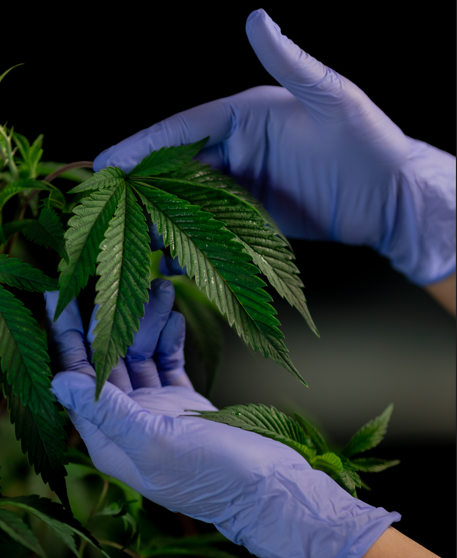Your dog can benefit from microdoses of CBD, but pet owners need to be careful when selecting cannabis products for their canine companions.

Cannabidiol (CBD) is a non-psychoactive compound found in the cannabis plant that is often used for its therapeutic benefits. Many pet parents have turned to certain CBD products to address issues such as pain, anxiety, inflammation, and seizures in their dogs. But giving your dog cannabis should not be taken lightly, and it may not be an appropriate choice for every situation or individual pup.
The endocannabinoid system in dogs
Dogs have an endocannabinoid system (ECS), just like humans and many other animals. This system regulates several physiological processes in your pup’s body and helps maintain homeostasis throughout. The ECS is made up of endocannabinoids, cannabinoid receptors, and enzymes.
Endocannabinoids are neurotransmitters produced on demand when imbalances in the body occur. These neurotransmitters then bind to two different kinds of cannabinoid receptors (CB1 and CB2) to activate them. CB1 receptors are located in the central nervous system and CB2 receptors are located in the peripheral organs and immune cells.
Activating these receptors leads to various regulatory effects, depending on the specific physiological process involved. For example, if your dog is experiencing inflammation, the ECS might work to reduce excessive immune responses to reduce symptoms. After the receptors take action, the enzymes break them down to prevent prolonged activation.
The ECS regulates physiological processes, including:
- Pain perception
- Mood and anxiety
- Appetite and digestion
- Immune function
- Sleep
- Memory and learning
Studies on the ECS’s presence and functionality in dogs suggest that they can potentially benefit from some cannabinoids found in the cannabis plant, like CBD. When ingested, these compounds can act like endocannabinoids, interacting with the CB1 and CB2 receptors to regulate their activity.
Hemp vs. marijuana for dogs
The 2018 Farm Bill created a legal distinction between hemp and marijuana that is important for the use of cannabis for pets. Hemp is defined as a cannabis plant that contains no more than 0.3% THC by dry weight. The bill clarifies that the THC compounds found in hemp are not considered controlled substances and are legal on the federal level.
Hemp plants are typically higher in CBD and other non-psychoactive compounds that are safe for animal consumption in small doses. The plant also has essential fatty acids, vitamins, minerals, and antioxidants that could benefit your pup.
Marijuana, on the other hand, is defined as a cannabis plant that contains more than 0.3% THC by dry weight. According to the Farm Bill, marijuana is still federally illegal.
The higher levels of THC in marijuana can cause psychoactive effects in both humans and animals.
Due to its THC content, marijuana is not recommended for pets. Marijuana can lead to toxicity in dogs. Whether you’re a medicinal cannabis user who uses marijuana or enjoys it for recreational purposes, don’t share it with your pup.
Marijuana toxicity can be lethal for your dog, causing severe side effects including lethargy, anxiety, vomiting, urinary incontinence, and potentially more serious complications. With these health risks in mind, avoid THC products altogether for your dog. Delta 9 THC is the most psychoactive compound in cannabis, and is not good for dogs even at low doses.
What is microdosing for dogs?
Microdosing involves giving a very small amount of a substance to achieve subtle therapeutic effects while minimizing the risk of adverse effects. Whether for anxiety, pain management, or immune support, microdoses can offer relief and avoid any negative side effects dogs may be susceptible to.
Research has shown that dogs have more cannabinoid receptors than humans, possibly making them more susceptible to toxicity from using certain compounds in cannabis, like tetrahydrocannabinol (THC). THC is the most psychoactive compound found in cannabis, most commonly associated with the “high” people experience when using the plant. That’s why microdosing hemp-derived CBD products is the way to go.
What are the benefits of using CBD for dogs?
Researchers are trying to learn more about the effects of cannabis on animals. Though research is still limited on the long-term effects, CBD could potentially give your dog the help it needs for some health issues. Here are some ways that CBD may help your pup:
- Reduction in pain
- Lower anxiety
- Improved stomach problems
Can CBD help with pain management?
CBD has been known to have beneficial effects on pets with chronic pain. The ECS can become dysregulated in dogs with chronic pain, contributing to prolonged discomfort. CBD’s interactions with the ECS may help restore balance and alleviate pain.
It does so by indirectly antagonizing the CB1 and CB2 receptors in the nervous system and immune cells. Research shows this interaction can reduce inflammation and regulate pain signals. CBD’s anti-inflammatory properties are particularly relevant in cases of joint pain, as it can help reduce the inflammation in the affected joints, providing relief and potentially improving motor control.
CBD also seems to reduce neuropathic pain in dogs. This type of pain is characterized by nerve damage or dysfunction, which can lead to a loss of coordination and muscle spasms. CBD’s potential to regulate pain signals extends to neuropathic pain, helping alleviate the abnormal pain sensations caused by nerve issues.
Product QUIZ
Need help deciding what product is best for you? Take our quiz, just three questions until your perfect match!
Can CBD reduce anxiety in dogs?
Between separation anxiety, noise sensitivities, travel phobias, and resource guarding, many forms of psychiatric disorders might be raising your dog’s stress levels. A dog’s ECS (like humans) helps regulate mood and stress responses in the body. When CBD influences this system, it has anxiolytic properties that could potentially reduce anxiety-related reactions.
CBD has also been known to regulate the serotonin receptors in the brain, offering a sense of calm to the body. It can also potentially reduce cortisol levels, which is a primary stress hormone that affects metabolism, immunity, and blood pressure.
One study shows that car trips are particularly difficult for some dogs. When given low doses of CBD, many of them experienced a significant reduction in stress and anxiety. The study called for more examination of how CBD can benefit dogs with anxiety.
Can CBD improve stomach problems in dogs?
CBD has anti-inflammatory, anti-nausea, and pain-relieving properties that could make it helpful for dogs struggling with various stomach issues. Certain gastrointestinal conditions, like IBS, IBD, and gastritis, are caused by inflammation of either the digestive tract or stomach lining.
With CBD’s anti-inflammatory properties, dogs may experience relief from symptoms like chronic diarrhea, vomiting, and loss of appetite.
Dogs might experience nausea and vomiting due to many factors, including motion sickness, chemotherapy, or other health conditions. CBD’s potential anti-nausea effects may minimize nausea and help your pup increase its appetite.
The pain-relieving properties of CBD could also be helpful to dogs who experience abdominal pain and other forms of discomfort due to their stomach issues.
Choosing the best CBD products for your dog
If you’re thinking of giving your dog CBD, chances are you’ve seen various pet products on the market they could take. Some of the most popular hemp products with CBD for pups include:
- CBD edibles: Edible products are treats and other snacks infused with CBD. They come in various flavors and forms, including biscuits, chewables, and soft treats.
- CBD oil: This is a liquid extract that is usually mixed with a carrier oil like coconut or hemp seed oil. CBD oil is usually administered orally by placing drops under a dog’s tongue or adding it to their food or treats.
- CBD balms: These are topical creams or salves that are applied topically to areas where a dog may experience discomfort, providing localized relief.
- CBD sprays: These are spray bottles with liquid CBD that can be sprayed into the dog’s mouth, on their food, or their coat.
Despite there being many options out there, choosing a CBD product for your pet requires careful consideration. Factors such as the dog’s size, the CBD concentration in the product, and the specific health conditions you’re addressing should not be overlooked.
Here are some things to think about before buying CBD for your dog:
- Talk to your vet: before giving your dog CBD, have a conversation with a veterinarian. Medical cannabis laws do not apply to dogs, so a vet can’t prescribe a product. However, they can offer you guidance based on your dog’s health and size to determine the best products and dosages of CBD to use.
- Start with microdoses: beginning with ultra-low doses of CBD will help minimize potential side effects your dog could experience when taking too much.
- Read product labels: different products have different concentrations of CBD. Plus, some CBD products have added ingredients that might not work for your dog.
- Observe your dog: watch for changes in your dog's behavior after using CBD. If you see positive effects, you may have found the right dose. Remember that each dog might have different subjective effects.
CBD for dogs FAQ
It is not recommended to give your dog edibles unless they are hemp-derived CBD edibles crafted specifically for dogs. Though there are many benefits of cannabis for both humans and pets, the way cannabis is administered to humans is not the same for dogs. If the product is a pet-grade CBD edible, you can administer microdoses of the treat to see how your dog reacts.
How long it takes for edibles to kick in for dogs depends on their consumption method. Tinctures and oils tend to work rather quickly, with an onset of about 15-20 minutes. This is because the substance does not need to go through a digestive process before it hits the bloodstream. For edibles, dogs might start experiencing effects around 30 minutes to two hours after eating them. It takes some time for the edible to digest before the effects occur.
There are many signs that your dog might have marijuana poisoning, including vomiting, lethargy, dilated pupils, and being disoriented. If you think your dog has taken too much marijuana, make a call to poison control. There are poison control centers all around the U.S. that you can call for assistance. Or, consider taking your pet to the vet or animal hospital to get checked out.
Weed derived from marijuana is bad for dogs. Delta 9 is psychoactive and not suitable for pets. It is recommended to stick with hemp-derived CBD dog health products as opposed to anything with THC in it.
Depending on your dog's condition, a vet might recommend you use hemp for your dogs. They cannot prescribe a product, but they can help you find one that will work for your pet. Hemp is generally higher in CBD and much lower in THC content, making it safe for your pet in low doses.
Citations:
Robert J. Silver. (n.d.). The Endocannabinoid System of Animals.
Farm Bill. (n.d.). USDA. https://www.usda.gov/farmbill
Gyles, C. (2016, December 1). Marijuana for pets? PubMed Central (PMC). https://www.ncbi.nlm.nih.gov/pmc/articles/PMC5109620/
Gugliandolo, E., Licata, P., Peritore, A. F., Siracusa, R., D’Amico, R., Cordaro, M., Fusco, R., Impellizzeri, D., Di Paola, R., Cuzzocrea, S., Crupi, R., & Interlandi, C. (2021, September 4). Effect of Cannabidiol (CBD) on Canine Inflammatory Response: An Ex Vivo Study on LPS Stimulated Whole Blood. Veterinary Sciences; Multidisciplinary Digital Publishing Institute. https://doi.org/10.3390/vetsci8090185
Hunt, A. B. G., Flint, H. E., Logan, D. W., & King, T. (2023, February 22). A single dose of cannabidiol (CBD) positively influences measures of stress in dogs during separation and car travel. Frontiers in Veterinary Science; Frontiers Media. https://doi.org/10.3389/fvets.2023.1112604
nama CBD FDA & Legal Disclaimer
Our products are not intended as a medical advice, diagnosis, or treatment of any disease. They are not a replacement for prescription medications and have not been evaluated by the Food and Drug Administration (FDA).
The information provided on this website does not, and is not intended to, constitute legal advice or any statements of the status of any laws. Any information, content, and materials available on this site are for general informational purposes only, and are not intended to be relied upon for any purpose.
Readers of this website should contact their attorney to obtain advice with respect to any particular legal matter including decisions on what products are, or are not, legal to sell, possess, or consume. No reader, user, or browser of this site should act or refrain from acting on the basis of information on this site without first seeking legal advice from their own counsel in the relevant jurisdiction.
Only your individual attorney can provide assurances that the information contained herein – and your interpretation of it – is applicable or accurate for your particular situation. Use of, and access to, this website or any of the links or resources contained within the site do not create an attorney-client relationship between the reader, user, or browser, and website authors, contributors, contributing law firms, or committee members and their respective employers.
About
Learn
Join us on this journey

© Copyright 2025 nama Products LLC. All Rights Reserved.
†These statements have not been evaluated by the Food and Drug Administration. These products are not intended to diagnose, treat, cure or prevent any disease. All information presented here is not meant as a substitute for or alternative to information from health care practitioners. Please consult your health care professional about potential interactions or other possible complications before using any product.
††The information provided on this website does not, and is not intended to, constitute legal advice or any statements of the status of any laws. Any information, content, and materials available on this site are for general entertainment purposes only, and are not intended to be relied upon for any purpose.

By clicking ‘Yes,’ you agree to our
Terms & Conditions and Privacy Policy
123 John Doe Street
Your Town, YT 12345
Store Hours
Sun: Closed
Mon-Fri: 9:00 - 17:00
Sat: 10:00 - 13:00
What to expect at pickup
Closed
Closing at 5pm
Closing at 5pm
Closing at 5pm
Closing at 5pm
Closing at 5pm
Closing at 1pm



![Euphoria Black Raspberry [10ct]](http://www.namacbd.com/cdn/shop/files/nama_black_raspberry_pouch.png?v=1715285306&width=480)
![Euphoria Black Raspberry [10ct]](http://www.namacbd.com/cdn/shop/files/nama_black_raspberry_nutrition_label.png?v=1715285313&width=480)
![Euphoria Kiwi Raspberry [10ct]](http://www.namacbd.com/cdn/shop/files/nama_kiwi_raspberry_pouch.png?v=1715285056&width=480)
![Euphoria Kiwi Raspberry [10ct]](http://www.namacbd.com/cdn/shop/files/nama_euphoria_kiwiraspberry_nutrition_facts.jpg?v=1715873960&width=480)
![Euphoria Triple Berry [10ct]](http://www.namacbd.com/cdn/shop/files/nama_euphoria_triple_berry_pouch.png?v=1715286095&width=480)
![Euphoria Triple Berry [10ct]](http://www.namacbd.com/cdn/shop/files/nama_euphoria_tripleberry_nutrition_facts.jpg?v=1715873950&width=480)


![Buzz Drops™ [THC Drink Drops]](http://www.namacbd.com/cdn/shop/files/nama_thc_buzz_drops.png?v=1711412866&width=480)
![Buzz Drops™ [THC Drink Drops]](http://www.namacbd.com/cdn/shop/files/buzz-drop-wine-comparison.png?v=1736882023&width=480)
![Buzz Packs™ [THC and CBD Powder Drink Mix]](http://www.namacbd.com/cdn/shop/files/nama_buzz_packs_thc_drink_pack_white_background.png?v=1741884660&width=480)
![Buzz Packs™ [THC and CBD Powder Drink Mix]](http://www.namacbd.com/cdn/shop/files/Buzz_Packs_Label.png?v=1741884660&width=480)














Comments (0)
There are no comments for this article. Be the first one to leave a message!